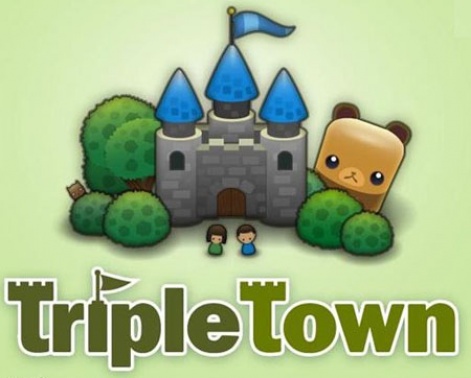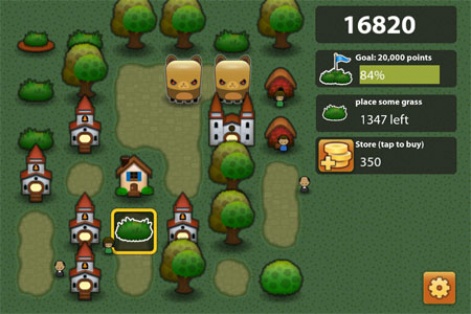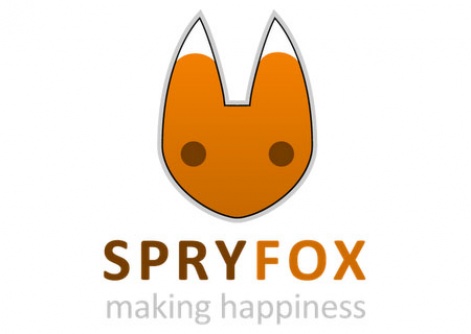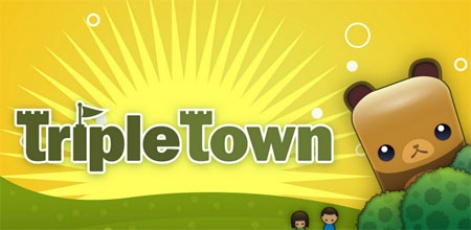Starting out as a basic puzzler on the untested waters of Amazon's Kindle [that's Kindle, not Kindle Fire mind], it has evolved into a freemium Facebook, iOS and Android hit with millions of fans.
Yet it hasn't been an easy ride.
Spry Fox co-founder and Triple Town designer Daniel Cook shares his thoughts on the story so far: from settling on the right business model; to battling cloners in the courts; and the origin of those damn ninja bears.
Pocket Gamer: Triple Town started life on Kindle. Why that particular platform and how did that decision shape the game's development ?
Daniel Cook: We chose Kindle for two reasons. The first was a business gamble. There was an opportunity to be one of the first new games on a platform with millions of users.
By being the first, you have a good shot at being featured and promoted by all the lovely marketing dollars the platform company devotes to promoting their platform.
The second reason was that I love designing games within serious constraints. The Kindle is not that far from programming on a calculator. You've got a black and white screen that refreshes at 1 frame per second. That means no animation. No shading. The interface is this stubby little joystick.
Triple Town was an exercise in making an evergreen game without relying on all that technical frosting. My big takeaway is that games as an art form transcend technology.
You have strong beliefs about how developers should approach genre. How did this inform the game's creation?
Our tendency as an industry is to take blueprints and copy them with small alterations. That's rather boring. What if instead, we go back to first principles and return to the root ideas behind the genre?
Many people think of Triple Town as a match-3 game, but it actually started with me trying to figure out the root concepts behind a game called Grow. This is a delightful series where you add a set of five or six objects to the board in a particular order. Based off the order, you get to see all these joyful animations of cause and effect.
For example you might add water to the board and because earlier you added a hill, you now have a waterfall floating into a moat that fills up with little happy boating people.
I loved the feel of building something exuberant just by adding a single object to the board. Was there a way to capture that without spending a hundred hours hand animating five minutes of gameplay?
So our early prototypes were just that ... add an object to the board, have some interaction rules and see if you can build something. As we experimented, we found some really deep strategic play when we added something from Poker, having sets of three-of-a-kind or four-of-a-kind.
It was sort of ironic that we started with a completely different genre and ended up with something people think of as superficially a match-3 game. If you play it, you'll see it still maintains something of the original Grow and in the end, Triple Town really is less about matching and more about building.

Triple Town on Kindle
Sometimes you just have to start from a different perspective and throw away all the standards in order to come up with something new.
A key stage in Triple Town's evolution came with the release of the browser version. How did that change the game, and can you talk about the process of coming up with the bears?
If there was one word that captured what we do at Spry Fox, it would be 'experiments'. As we moved to Triple Town to the browser a big question was "Hey, can we turn a single player puzzle game into a free-to-play game?"
I tend to trust hands on learning over expert opinions. It is one thing to gripe that energy systems are bad, but you learn so much more if you actually try to build one, put it in front of real players and go through the hard work of trying to make it work.
So we added an item store, an energy system in the form of turns that recharge slowly over time and I tuned the game to work with these additions.
As for the bears, they appeared in the Kindle version, but they weren't bears. Originally, I had specified them as 'boy' and 'girl' and the art ended up being these completely adorable children, that you then proceeded to murder and turn into tombstones. Early play testers found this a little creepy.
When I finally reimagined the game for the web, I wanted to give the game a less abstract world. So the backstory of the game is that you are a colonist from a far off empire settling this new land. However, the land is populated by these huge, peaceful native creatures.

Huge, peaceful native creatures
I borrowed a bit from the experiments involving the children art and drew the bears as a blend of cute and scary. The goal was for you to still enjoyed killing them, but at the same time feel a slight tinge of regret when the natives turn into tombstones and eventually colonial churches.
What I found fascinating about this process is that no matter what we used for an image, people learned to hate the ninja bears. They could be children, monsters, numbers, whatever .. .it didn't matter. During playtests I'd hear frightening things like "It was hard killing them the first time, but then it became easier."
The hatred was this huge emotional response to what was essentially an abstract game token. It really makes you think. If abstract rules alone can generate such a strong response how might we advance game design to be a primary driver of emotional play?
Remember, this game was on a black and white Kindle and I was seeing interesting emotional dynamics that you'd be hard pressed to uncover in even the mostly lushly modeled triple-A title. Perhaps our fixation on polish as the primary means of expression diverts our energy from the true potential of games.
What were the challenges of bringing it to iOS and Android?
The mobile markets move extremely quickly and within weeks of Triple Town coming out on Facebook, we had clones on sale. I don't blame customers for playing clones ... they just want great games and if we can't give them our game, someone else will.
The same customer demand that drives piracy in places like Russia drives the cloning racket on iOS and Android. Customers hear about the game on its launch date and want it immediately, independent of any sort of physical reality like translation or porting. Not their problem.
Small indies are at an immense disadvantage here. They lack both the development bandwidth and the marketing clout to rapidly build and distribute their games.
You can almost think of indies as small boutique shops that slowly hand craft their special experiences while the larger companies have fast moving game factories backed by massive distribution and promotion budgets.
The big risk for a smaller team is that the large company quickly creates a copy and by moving into an untapped market establishes themselves as the dominant brand in the mind of the consumers. You see this clearly with Zynga games ... they move into a genre and the originators of the idea stop selling as well.
An indie game that could have sold for years as something unique and wonderful now finds itself pushed into the shadows by the bigger, more moneyed company.
So we needed to rush to get Triple Town out. December and January were complete madness as we struggled to get a solid version of Triple Town available to customers.
There was this intense feeling of being chased by a pack of soulless wolves. Big kudos go out to Cliff Owen for doing most of the heavy lifting ... somehow we got the game out and both Apple and Google were kind enough to feature it.
Even with the very helpful features and good review scores, it wasn't all instant success. I think those days are mostly past. The market has shifted a lot and just having a good game isn't enough.
Many of the free titles at the top of the charts get there though the use of bot nets, cross promotion networks and massive advertising spends. Money talks. All this means the charts are far less of a meritocracy than they used to be.
Given the state of app discovery, we had no idea if anyone would pay attention to our little game. In the end, I think it worked out. People seem to like the game and we've got it out to a huge number of players. I'm not in this for the gold necklaces, so that is enough for me.
The initial mobile release was less advanced than the browser version. Presumably this was to do with the cloning? You felt rushed?
Oh, absolutely. Going forward, we are going to try to invest more upfront in cross-platform development so that we can release to all our players closer to same time. There's a cost to taking this path, both on the development and the design side. But the clone factories move at such a rapid pace, we need to be in front of people as soon as possible.
I want to serve our players, not give up on entire markets because some bean counting business schmuck moves faster than I do.
What development tools did you use during development?
For Triple Town on the web, we used Flash and for iOS and Android we used Unity.
What was the biggest challenge during development?
The biggest challenge has been figuring out how to make money off the game. I think we are at an interesting inflection point where the traditional forms of game design are coming in conflict with the new realities of business.
Triple Town, at its heart seems like a classic puzzle game. You could easily imagine it being sold in the same way as Bejeweled was a decade ago.

Triple Town on iPad
You plunk down your 10 bucks and then you've got a game you own for the rest of your life. That's a proven way of selling games. It is what casual players expect and they get very upset when the game doesn't work as expected.
It also is increasingly not that attractive. As a developer, I generally can't sell a mobile game for 10 bucks. Players would laugh me out of town. They've been trained that mobile games cost 99 cents. But in order for the game to break even, I now need to sell 10 times as many copies and that is much less likely to happen.
If you get really lucky and hit it big, you earn enough to build another game. Older developers have been down this path before and history tells us that all it takes is one or two failed projects to kill even a successful studio.
Players feel incredibly entitled to their current low prices, but it puts a tremendous squeeze on the developer. So two options: Starve trying to sustain an unsustainable business model. Or look elsewhere.
The typical answer to this problem is to join up with a publisher and be part of their portfolio of games. Some games live, some die, but on average they make money. I've lived through this cycle and it isn't pretty. Developers are turned into sharecroppers, working at the beck and call of managers that really don't give a damn about advancing the art of games.
It seemingly works short term, but in the long term the innovation is sucked right out of the market. Look at the wreckage of the casual games market where in order to 'reduce portfolio risk' the publishers end up predominantly funding hidden objects and time management games. I'd like to make new types of games for the long terms, so that isn't an attractive path.
Now a new-ish alternative to all this is to switch up the business model and treat games as a service, one where most gain access to the game for free and then if you like it pay some money over time. This gives you a steady, reliable stream of revenue.
This works much better because by casting the net really wide (across millions of people) you find the truly passionate players that treat the game as a hobby. Your true fans are willing to pay 'hobby prices' ... hundreds, even thousands of dollars to enjoy the game. And they'll do it season after season.
This is a very different mindset than just buying a consumable game, beating it and moving onto the next. Instead you want to build something that a small (but substantial) group of people is passionate about for years on end.
Since Triple Town has a lot of the attributes of a good hobby, we thought we might be able to experiment with the service model.
There's a very dedicated group of people who play it for years on end and they deeply love the game. It is part of the fabric of their lives. Yet, it confusingly looks like a lot like a traditional buy & beat puzzle game. It isn't an MMO and it doesn't look like an online service. So you've got this clash between a once popular traditional form and a highly desirable new business model.
In the end, I think the traditional design loses and ends up morphing into something more amendable to the requirements of the service model. I don't necessarily like that, but having struggled with Triple Town, I think that it may be inevitable. So now whenever I come up with an idea like Triple Town, I think to myself, "How would this work as a free-to-play MMO?"
Did anything come of the lawsuit with 6L, and more generally how has that episode changed the way you work?
I can't talk too much about the lawsuit since it is still ongoing. I would say that the experience has made me more interested in radical innovation than before.
Cloners are essentially risk adverse. That's why they prefer to steal the idea of others rather than build something honest from scratch. There are amazing frontiers out there for game design and the most exciting new genres are still yet to come.

If anything, I want build a successful game that is so incredibly wild that cloners are scared to follow. It is like rock climbing while being chased by a bully.
You recently released a sizeable update for the mobile version. Is the intention to eventually get it running alongside the browser versions, or do you see them as separate entities?
For the moment, they'll continue to be separate entities. I think the expectations of the two markets are very different.
Do you feel like you got the freemium model right in the mobile version?
I don't think we made the perfect freemium model for the mobile version. It sort of does the job, but now that I've lived with it I understand some of the limitations.
The turn model doesn't feel right to me because it restricts people from playing. If anything, I'd prefer that people play the game as much as they want and end up so in love with the game that they shower us with money. Still working on that.
But in the bigger picture, I look at my games as ten-year projects so I'm never completely happy with the results. The current freemium features are just another opportunity to run some more experiments. Who knows, maybe eventually we'll learn how to do it right.
At what point did you realise you'd come up with a game that you were happy with?
I fell in love with Triple Town after the first successful prototype. I played it for a couple hours and the game virus sunk its patterns into my brain. However, I tend to be immensely self critical and in the final analysis, Triple Town succeeds on some levels and still remains an ongoing challenge in others.
One the positive side, people like the game and it has been played by millions of players. As much as I'm against blatant cloning, I hope that the concepts of simple but deep evergreen design will influence future designers. When I see someone making an interesting Triple Town variant in Ludem Dare [the rapid game making competition], I get excited.
On challenge side, I still feel there is a much richer world contained within the Triple Town playscape.
I still need to uncover that. When you design a deep game, you end up creating a mathematical universe full of delectable nooks, tantalising horizons and undiscovered opportunities. Those are still waiting inside the mechanical folds of Triple Town. Someone just needs to explore them and bring them to light.
There's a strong theme of colonisation and imperialism in the game. Can you explain how this came about and what you think it adds?
I work on the game mechanics first and then pay attention to the emotions that those mechanics create during the playtests. Then I find a theme that fits that emotional pattern and start riffing off it.
The inherent themes of Triple Town are about building and resistance to that building due to territorial loss to both inefficiency and Others. The players often go through this cycle of irritation, destruction, guilt, justification and then practised cruelty when dealing with the natives in the game.
I come from English and French blood. Growing up I found it difficult to imagine my early relatives having a genocidal mindset during the early days of colonisation. What makes a person do that?
As a game designer, I can't help but see how the system in place at the time was essential to creating and reinforcing the attitudes that drove their behaviour. There is an economic, territorial and systemic basis to historical behaviour and we can model that in games.

I'm not sure if anything positive comes out of my including this model of colonisation in Triple Town. The vast majority of players will ignore it. I toned the theme down a little so it wouldn't be too on the nose. However, it did help me personally understand how easy it is to use mechanical rules to demonise almost anything.
We are less moral and more driven by systems and procedures than we like to think. Perhaps (in my fantasies) one or two players might use the game to contemplate the process through which they learn to hate.
What can you reveal about Spry Fox's future plans?
The future is really rather simple. We are going to keep making original games and expanding out old titles.
I really appreciate all the support that players have shown. It keeps me going. These games we make are incomplete without players that love them. An unplayed game is just a bunch of dumb code. But if people keep playing them and turning that dumb code into something meaningful, I'm going to keep trying to invent something worthy of your effort.
You can see what Spry Fox gets up to via its website.
If you haven't played Triple Town yet you really should. It's free and you can find it on iOS, Android and Facebook.





















